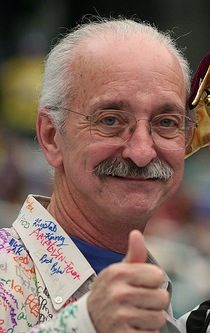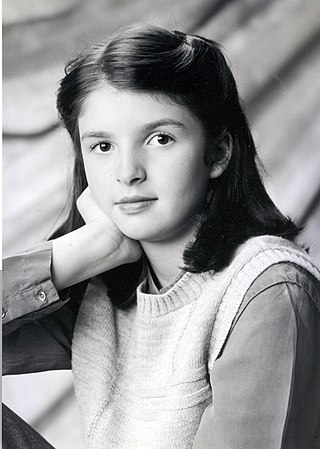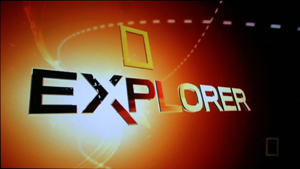Related Research Articles
Frontline is an investigative documentary program distributed by the Public Broadcasting Service (PBS) in the United States. Episodes are produced at WGBH in Boston, Massachusetts. The series has covered a variety of domestic and international issues, including terrorism, elections, environmental disasters, and other sociopolitical issues. Since its debut in 1983, Frontline has aired in the U.S. for 42 seasons, and has won critical acclaim and awards in broadcast journalism. In 2024, Frontline won its first Oscar at the 96th Academy Awards for Best Documentary Feature, 20 Days in Mariupol, made by a team of AP Ukrainian journalists. Frontline has produced over 800 documentaries from both in-house and independent filmmakers, 200 of which are available online.

Peter Graves was an American actor who portrayed Jim Phelps in the television series Mission: Impossible from 1967 to 1973 and in its revival from 1988 to 1990. His elder brother was actor James Arness. Graves also played airline pilot Captain Clarence Oveur in the 1980 comedy film Airplane! and its 1982 sequel Airplane II: The Sequel.
Live television is a television production broadcast in real-time, as events happen, in the present. In a secondary meaning, it may refer to streaming television where all viewers watch the same stream simultaneously, rather than watching video on demand.
This Old House is an American home improvement media brand with television shows, a magazine, and a website. The brand is headquartered in Stamford, Connecticut. The television series airs on the Public Broadcasting Service (PBS) television network and follows remodeling projects of houses over a series of weekly episodes.

The Robotics Institute (RI) is a division of the School of Computer Science at Carnegie Mellon University in Pittsburgh, Pennsylvania, United States. A June 2014 article in Robotics Business Review magazine calls it "the world's best robotics research facility" and a "pacesetter in robotics research and education."

Peep and the Big Wide World (PATBWW) is an animated children's television series created by Danish-Canadian animator Kaj Pindal. It revolves around the lives of Peep, Chirp, and Quack, as viewers discover, investigate, and explore the world around them.

Woodie Claude Flowers was a professor of mechanical engineering at the Massachusetts Institute of Technology. His specialty areas were engineering design and product development; he held the Pappalardo Professorship and was a MacVicar Faculty Fellow.

Emily Rosa is the youngest person to have a research paper published in a peer reviewed medical journal. At age nine Rosa conceived and executed a scientific study of therapeutic touch which was published in the Journal of the American Medical Association in 1998. She graduated from the University of Colorado at Denver in 2009 with a major in psychology. Her parents, Larry Sarner and Linda Rosa, are leaders of the advocacy group Advocates for Children in Therapy.

Biography is an American documentary television series and media franchise created in the 1960s by David L. Wolper and owned by A&E Networks since 1987. Each episode depicts the life of a notable person with narration, on-camera interviews, photographs, and stock footage. The show originally ran in syndication in 1962–1964, and in 1979, on A&E from 1987 to 2006, and on The Biography Channel from 2006 to 2012. After a five-year hiatus, the franchise was relaunched in 2017. Over the years, the Biography media franchise has expanded domestically and internationally, spinning off several cable television channels, a website, a children's program, a line of books and records, and a series of made-for-TV movies, specials, and miniseries, among other media properties. Biography has won a Peabody Award (1962) and three Emmy Awards.

A television presenter is a person who introduces or hosts television programs, often serving as a mediator for the program and the audience. It is common for people who garnered fame in other fields to take on this role, but some people have made their name solely within the field of presenting—such as children's television series or infomercials—to become television personalities.

Astro Boy is a Japanese television series that premiered on Fuji TV on New Year's Day, 1963, and is the first popular animated Japanese television series that embodied the aesthetic that later became familiar worldwide as anime. It originated as a manga of the same name in 1952 by Osamu Tezuka, revered in Japan as the "God of Manga". It lasted for four seasons, with a total of 193 episodes, the final episode presented on a Saturday, New Year's Eve 1966.

National Geographic Explorer is an American documentary television series that originally premiered on Nickelodeon on April 7, 1985, after having been produced as a less costly and intensive alternative to PBS's National Geographic Specials by Pittsburgh station WQED. The first episode was produced by WQED and featured long-time Explorer cameraman Mark Knobil, who is the few staff members with the franchise during all 24 seasons. The program is the longest-running documentary television series on cable television. Presented every Sunday from 5:00 pm to 8:00 pm, the original series was three hours in length, containing five to ten short films. Although the National Geographic Society had been producing specials for television for 20 years prior to Explorer, the premiere of the series required an increase in production from 4 hours of programming a year to 156 hours. Tim Cowling and Tim Kelly were the executive producers for the series during this transition.
The Carl Sagan Award for Public Understanding of Science is an award presented by the Council of Scientific Society Presidents (CSSP) to individuals who have become “concurrently accomplished as researchers and/or educators, and as widely recognized magnifiers of the public's understanding of science.” The award was first presented in 1993 to astronomer Carl Sagan (1934–1996), who is also the award's namesake.

The Magic School Bus is an animated educational children's television series, based on the book series of the same name by Joanna Cole and Bruce Degen. Originally broadcast from 1994 to 1997, the series received critical acclaim for its use of celebrity voice talent, as well as combining entertainment with an educational series. The series stars Lily Tomlin as the voice of Ms. Frizzle. The theme song is performed by Little Richard.

Our World is an American television news program that aired on ABC for 26 episodes, from September 25, 1986 to May 28, 1987. The show was anchored by Linda Ellerbee and Ray Gandolf. Each episode of the program examined, through the use of archival film and television footage, one short period in American history.

Alan Alda is an American actor. A six-time Emmy Award and Golden Globe Award winner and a three-time Tony Award nominee, he is best known for playing Captain Benjamin Franklin "Hawkeye" Pierce in the CBS wartime sitcom M*A*S*H (1972–1983). He also wrote and directed numerous episodes of the series.
Craig Plestis is the President and CEO of Smart Dog Media, a reality programming production company. Plestis is an executive producer of The Masked Singer and I Can See Your Voice.
Scientific American Frontiers was an American science television program aired by PBS from 1990 to 2005. The show was a companion program to the Scientific American magazine, and primarily covered new technology and discoveries in science and medicine. The Chedd-Angier Production Company, which had recently produced Discover: The World of Science, produced the show for PBS. Frontiers typically aired once every two to four weeks.

Let's Go Luna! is an educational animated children's television series created by Joe Murray that aired on PBS Kids. Murray formerly worked on the Nickelodeon animated series Rocko's Modern Life and Cartoon Network animated series Camp Lazlo. It is co-produced by 9 Story Media Group. Judy Greer provides the voice of the titular Luna. In the first season, there are 38 half-hour episodes and a one-hour special. The second season has 26 episodes and premiered on May 10, 2021. Each episode consists of two 11-minute story segments, with a short segment of one of the characters telling a folktale, song or poem from that country in between.
References
- 1 2 3 "Chedd-Angier - About Us".
- ↑ "Peter Graves Obituary". Legacy.com. Retrieved 20 September 2016.
- ↑ "Discover: The World of Science". TV Guide. Retrieved 20 September 2016.
- ↑ "DISCOVER WITH PETER GRAVES: SNAKES". NBC. Retrieved 20 September 2016.
- ↑ "DISCOVER WITH PETER GRAVES: BACTERIA". NBC. Retrieved 20 September 2016.